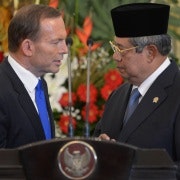Canberra suspicion over China's new fund
The Conversation
Senior cabinet ministers are believed to be divided over whether Australia should sign up to an internationally-funded infrastructure development bank that China is set to launch next month.
Treasurer Joe Hockey is open to the idea of Australia joining the Asian Infrastructure Investment Bank, but Foreign Minister Julie Bishop is opposed. It is understood that Trade and Investment Minister Andrew Robb believes the proposal has merit and could add value to the region.
Australia has been under pressure from the United States not to participate in the new bank.
The position of Prime Minister Tony Abbott is unclear on the issue, that could have ramifications for the final days of bedding down the Australia-China free trade agreement which the government wants concluded this year and preferably by the G20 leaders meeting in Brisbane next month.
The Chinese plan is being viewed internationally in the wider geopolitical context of Chinese-US competition in the region. The Americans, who see the bank as potentially a way of China increasing its clout with countries in southeast Asia, have been strongly lobbying Australia to keep out of it.
The issue is to come before cabinet imminently, as China plans to announce the bank at the APEC summit, which will be held in Beijing in November. Hockey will be in Beijing this week for the APEC finance ministers meeting, where the bank will be a topic of discussion.
The bank fits in with Hockey's pitch to G20 finance ministers that it is vital to get more investment in infrastructure to increase growth. Australia is promoting a target of lifting global growth by 2 per cent over five years above what it would otherwise be. The G20 countries have submitted individual action plans for growth, which heavily feature infrastructure development.
It is understood that Hockey has argued that if Australia is to have any influence with the new institution, it needs to be in it.
But Bishop maintains that the bank has potential governance problems, and it could become a slush fund for China to pursue its strategic interests in the region, with Australia ending up with no sway in a body into which it had put capital.
The bank would offer funds to underdeveloped countries in the region for projects in areas such as energy, telecommunications and transport. China says it will contribute much of the initial $US 50 billion.
An article in the New York Times earlier this month reported that Americans officials had lobbied against the development bank “with unexpected determination and engaged in a vigorous campaign to persuade important allies to shun the project”.
“The dispute, the latest manifestation of Chinese-American competition in Asia, could escalate in coming weeks, as Beijing pushes to confirm South Korea and Australia as founding partners of the bank in time for [President Xi Jinping] to formally announce it at a summit meeting of Asian leaders in November. President Obama is scheduled to attend the meeting, and Washington is pressing the two countries to reject the Chinese plan,” the NYT article said.
China had asked dozens of nations to contribute funds, and hoped it would become a global institution that rivalled the World Bank.
“To give it broader scope, the Chinese have invited and won the support of some wealthy Middle East nations, including Qatar and Saudi Arabia. But if Washington persuades South Korea and Australia to abstain, it would all but ensure membership in the bank would be limited to smaller countries, depriving it of the prestige and respectability the Chinese seek,” the article said.
The US is arguing that the new body would undercut the World Bank and compromise environmental standards. But supporters of the Chinese plan point to the need for development and capital in the region.
![]() Michelle Grattan does not work for, consult to, own shares in or receive funding from any company or organisation that would benefit from this article, and has no relevant affiliations.
Michelle Grattan does not work for, consult to, own shares in or receive funding from any company or organisation that would benefit from this article, and has no relevant affiliations.
This article was originally published on The Conversation. Read the original article.













